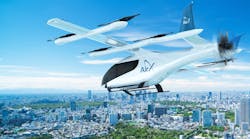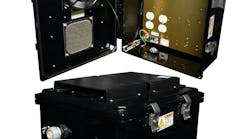By John Keller
PALM BAY, Fla. - Executives at Intersil Corp. are moving into the satellite and manned spacecraft market for DC-DC converter power electronics in a big way with their new Star Power family of radiation-hardened power devices.
Engineers from Intersil, formerly Harris Semiconductor of Palm Bay, Fla., are building on their experience of designing rad-hard power electronics such as metal-oxide semiconductor field-effect transistors (MOSFETs), says Andy Khayat, Intersil's business development manager for space and defense products.
The company's new line of DC-DC converters will be available in 80-watt and 30-watt versions, with the first deliveries set for next December, Khayat says.
Intersil designers have a long history as suppliers of rad-hard power devices such as power integrated circuits and field effect transistors (FETs), which they sold to other DC-DC converter manufacturers.
"As we improved the ICs and FETs for DC-DC converter applications, we needed engineers with more system-level savvy," Khayat says. "They told us just to provide DC-DC converters for the market since we already did all the work."
Intersil leaders acted on that advice. "We are taking the small chips and all the silicon we make, and are integrating them into a much higher-level assembly," Khayat explains.
The move to DC-DC converters places Intersil in direct competition with more established DC-DC converter suppliers Lambda Advanced Analog Inc. of Santa Clara, Calif.; Interpoint Corp. of Redmond, Wash.; and Magnitude-3 LLC of San Jose, Calif., Khayat says. "We are going to the space market only," Khayat explains.
Intersil's primary market for the new DC-DC converters is for class-K rad-hard applications, Khayat says, adding that he expects Intersil's top three customers for the devices will be satellite producers Lockheed Martin, Boeing, and TRW.
The Intersil converters are designed to withstand 100 kilorads of total-dose radiation, and will resist single-event upsets amid heavy ion strikes of as strong as a 82 million electron volts, Kayat says.
Intersil's primary selling point for the new line of DC-DC converters is efficiency. "Our efficiency is a flat 90 percent from half load to full load," Khayat claims. "Efficiency today typically for other space converters is 75 to 80 percent."
Offering such high efficiency simplifies the system designer's job because he can use less power generation up front, Khayat says. "If you are only 75 percent efficient, you throw away 25 percent of the power your system makes." Using efficient DC-DC converters enables designers to use fewer power cells, fewer batteries, and helps them save money in basic power generation, he claims.
Heat also is a big issue related to power-device efficiency, Khayat says. "That wasted 25 percent comes off converters in the form of heat," he says. The Intersil devices "transfer more of the power to the electronics, rather than transferring that lost power into heat that must be removed from the spacecraft somehow. Thermal management is complex, expensive, and is a lot of weight."
Intersil marketers began showing working samples of the new converters in April, and are set to have working samples available by the end of this month. The company was to begin taking orders in May, with deliveries set for December.
For more information, contact Intersil by phone at 321-724-7000, by fax at 321-729-4140, by post at 2401 Palm Bay Road, Palm Bay, Fla., 32905 or on the World Wide Web at http://www.intersil.com/.


